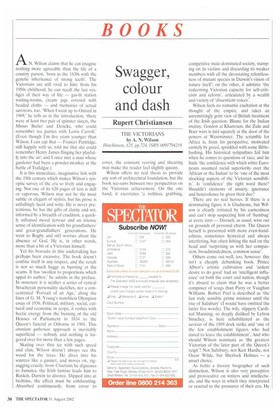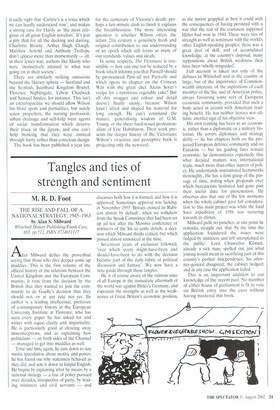Swagger, colour and dash
Rupert Christiansen
THE VICTORIANS by A. N. Wilson Hutchinson, £25, pp.724, ISBN 0091794218
A
N. Wilson claims that he can imagine nothing more agreeable than the life of a country parson, 'born in the 1830s with the genetic inheritance of strong teeth'. The Victorians are still vivid to him: from his 1950s childhood, he can recall the last vestiges of their way of life — gas-lit station waiting-rooms, cream jugs covered with
beaded cloths and memories of actual survivors, too. When I went up to Oxford in 1969,' he tells us in the introduction, 'there were at least two pair of spinster sisters, the Misses Butler and Deneke, who could remember tea parties with Lewis Carroll.' (Even though I'm five years younger than Wilson, I can cap that — Frances Partridge, still happily with us, told me that she could remember Henry James flinging her playfully into the air; and I once met a man whose gardener had been a powder-monkey at the battle of Trafalgar.)
It is this immediate, imaginative link with the 19th century which makes Wilson's synoptic survey of the era so lively and engaging. Not one of its 620 pages of text is dull or vaporous. Wilson may not be the most subtle or elegant of stylists, but his prose is unfailingly lucid and witty. He is never pretentious, he has the gifts of clarity and wit. informed by a breadth of erudition, a quickly inflamed moral fervour and an intense sense of identification with his grandfathers' and great-grandfathers' generations. He went to Rugby and still worries about the absence of God. He is, in other words, more than a bit of a Victorian himself.
Yet his bravado in this undertaking has perhaps been excessive. The book doesn't confine itself in any respect, and the result is not so much baggy as bursting at the seams. It has 'swollen to proportions which appal its author,' he admits in the preface. In structure it is neither a series of cynical Stracheyan personality sketches, nor a concentrated 'Portrait of an Age,' along the lines of G. M. Young's matchless Olympian essay of 1936. Political, military, social, cultural and economic in scope, it rushes with hectic energy from the burning of the old Houses of Parliament in 1834 to the Queen's funeral at Osborne in 1901. This omnium gatherum approach is inevitably superficial — nobody and nothing is lingered over for more than a few pages.
Skating over thin ice with such speed and elan, Wilson doesn't always see the wood for the trees. He dives into his sources like a gannet, and moves on, zigzagging crazily: from Chartism he digresses to Jamaica, the Irish famine leads him to Ruskin, Darwin to divorce. Dipped into at bedtime, the effect must be exhilarating. Absorbed continuously, from cover to cover, the constant veering and shearing may make the reader feel slightly queasy.
Wilson offers no real thesis to provide any sort of architectural foundation, but the book see-saws between two perspectives on the Victorian achievement. On the one hand, it excoriates 'a ruthless, grabbing, competitive male-dominated society, stamping on its victims and discarding its weaker members with all the devastating relentlessness of mutant species in Darwin's vision of nature itself; on the other, it admires 'the redeeming Victorian capacity for self-criticism and reform', articulated by a wealth and variety of 'dissentient voices'.
Wilson feels no romantic exultation at the thought of the empire, and takes an unremittingly grim view of British treatment of the Irish question. Blame for the Indian mutiny, Gordon at Khartoum, the Zulu and Boer wars is laid squarely at the door of the powers at Westminster. The scramble for Africa is, from his perspective, motivated entirely by greed, sprinkled with some Biblebashing. His historical sympathies fail him when he comes to questions of race, and he finds 'the confidence with which white Europeans assumed racial superiority over the African or the Indian' to be 'one of the most shocking aspects of the Victorian sensibility'. Is 'confidence' the right word there? Shouldn't elements of anxiety, ignorance and benevolence be given their due?
There are no real heroes. If there is a dominating figure it is Gladstone, but Wilson is clearly irritated by his earnestness and can't stop suspecting him of 'humbug' at every turn — Disraeli, as usual, wins out on grounds of personal charm. The Queen herself is presented with more even-handedness, sometimes hysterical and always interfering, but often hitting the nail on the head and 'surprising us with her compassion, broadmindedness, common sense'.
Others come out well, too, however: this isn't a cheaply debunking book. Prince Albert's artistic cultivation and 'ardent desire to do good' had an 'intelligent influence' on both the court and nation, though it's absurd to claim that he was a better composer of songs than Parry or Vaughan Williams. Robert Peel is described as 'the last truly sensible prime minister until the rise of Salisbury' (I would have omitted the latter five words). The wily, slippery Cardinal Manning, so deeply disliked by Lytton Strachey, is here rehabilitated as the saviour of the 1889 dock strike and 'one of the few establishment figures who had dared to leave the establishment'. And who should Wilson nominate as 'the greatest Victorian of the later part of the Queen's reign'? Not Salisbury, not Keir Hardie, not Oscar Wilde, but Sherlock Holmes — a smart choice.
As befits a literary biographer of such distinction, Wilson is also very perceptive and provocative on writers and intellectuals, and the ways in which they interpreted or reacted to the pressures of their era. He is sadly right that 'Carlyle's is a voice which we can hardly understand now', and makes a strong case for Hardy as 'the most religious of all great English novelists'. It's just a pity that for all the ducking and darting, Charlotte Bronti.:, Arthur Hugh Clough, Matthew Arnold and Anthony Trollope don't appear more than momentarily — all, in their lesser way, authors like Hardy who were 'instinctively attuned to what was going on in their society'.
There are similarly striking omissions beyond the literary sphere — Scotland and the Scottish, Isambard Kingdom Brunel, Florence Nightingale, Edwin Chadwick and Samuel Smiles, for instance. This isn't an encyclopaedia: we should allow Wilson his blind spots and partialities, but surely screw propellers, the nursing profession, urban drainage and self-help were agents of social transformation which deserve their place in the jigsaw, and one can't help thinking that they were omitted through hurry rather than conscious design.
The book has been published a year late for the centenary of Victoria's death: perhaps a last-minute dash to finish it explains the breathlessness. The more interesting question is whether Wilson offers the infant 21st century a genuinely fresh and original contribution to our understanding of an epoch which still forms so many of our standards, values and ideals.
In some respects, The Victorians is irresistible — how can one not be seduced by a book which informs you that Parnell should be pronounced Parn-ull not Parn-e//e and which opens its chapter on the Crimean War with the great chef Alexis Soyer's recipe for a nutritious vegetable cake? But all this swagger and colour and detail doesn't finally satisfy, because Wilson hasn't sifted and shaped his material for long enough. He can't command the mature, generalising wisdom of G.M. Young, or the sheer hard-nosed professionalism of Eric Hobsbawrn. Their work presents the deeper history of the Victorians; Wilson's vivacious and perceptive book is projecting only the newsreel.



























































 Previous page
Previous page